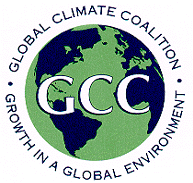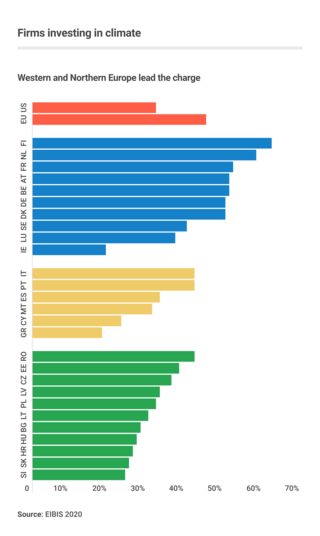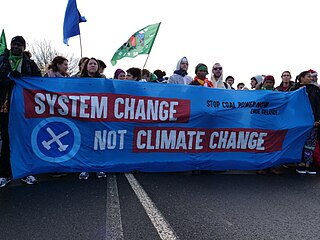
The Global Climate Coalition (GCC) (1989–2001) was an international lobbyist group of businesses that opposed action to reduce greenhouse gas emissions and engaged in climate change denial, publicly challenging the science behind global warming. The GCC was the largest industry group active in climate policy and the most prominent industry advocate in international climate negotiations. The GCC was involved in opposition to the Kyoto Protocol, and played a role in blocking ratification by the United States. The coalition knew it could not deny the scientific consensus, but sought to sow doubt over the scientific consensus on climate change and create manufactured controversy.
The United Kingdom's Climate Change Programme was launched in November 2000 by the British government in response to its commitment agreed at the 1992 United Nations Conference on Environment and Development (UNCED). The 2000 programme was updated in March 2006 following a review launched in September 2004.

Power Shift is an annual youth summit which has been held in New Zealand, Australia, Canada, the United Kingdom and the United States. Other Power Shift Conferences are also being organised by members of the International Youth Climate Movement including Africa, Japan and India. The focus of the events is on climate change policy.

The politics of climate change results from different perspectives on how to respond to climate change. Global warming is driven largely by the emissions of greenhouse gases due to human economic activity, especially the burning of fossil fuels, certain industries like cement and steel production, and land use for agriculture and forestry. Since the Industrial Revolution, fossil fuels have provided the main source of energy for economic and technological development. The centrality of fossil fuels and other carbon-intensive industries has resulted in much resistance to climate friendly policy, despite widespread scientific consensus that such policy is necessary.

Business action on climate change includes a range of activities relating to climate change, and to influencing political decisions on climate change-related regulation, such as the Kyoto Protocol. Major multinationals have played and to some extent continue to play a significant role in the politics of climate change, especially in the United States, through lobbying of government and funding of climate change deniers. Business also plays a key role in the mitigation of climate change, through decisions to invest in researching and implementing new energy technologies and energy efficiency measures.

The Campaign against Climate Change is a UK-based pressure group that aims to raise public awareness of anthropogenic climate change through mobilising mass demonstrations. Founded in 2001 in response to President Bush's rejection of the Kyoto Protocol, the organization saw a steady increase in attendance on marches before a sudden take-off in interest between October - December 2005. An estimated 10,000 people attended a rally in London on 3 December 2005. The following year on 4 November 2006 the Campaign organised a march from the US Embassy to the iCount event in Trafalgar Square. At least 25,000 people gathered in Trafalgar Square that day making it easily the biggest demonstration on climate change in the UK to date, until The Wave march in December 2009.
Carbon rationing, as a means of reducing CO2 emissions to contain climate change, could take any of several forms. One of them, personal carbon trading, is the generic term for a number of proposed carbon emissions trading schemes under which emissions credits would be allocated to adult individuals on a (broadly) equal per capita basis, within national carbon budgets. Individuals then surrender these credits when buying fuel or electricity. Individuals wanting or needing to emit at a level above that permitted by their initial allocation would be able to purchase additional credits in the personal carbon market from those using less, creating a profit for those individuals who emit at a level below that permitted by their initial allocation.

Stop Climate Chaos Scotland
Energy Saving Trust is a British organization devoted to promoting energy efficiency, energy conservation, and the sustainable use of energy, thereby reducing carbon dioxide emissions and helping to prevent man-made climate change. It was founded in the United Kingdom as a government-sponsored initiative in 1992, following the global Earth Summit.

The Climate Change Act 2008 is an Act of the Parliament of the United Kingdom. The Act makes it the duty of the Secretary of State to ensure that the net UK carbon account for all six Kyoto greenhouse gases for the year 2050 is at least 100% lower than the 1990 baseline, toward avoiding dangerous climate change. The Act aims to enable the United Kingdom to become a low-carbon economy and gives ministers powers to introduce the measures necessary to achieve a range of greenhouse gas reduction targets. An independent Committee on Climate Change was created under the Act to provide advice to UK Government on these targets and related policies. In the act Secretary of State refers to the Secretary of State for Energy and Climate Change.

The Carbon Pollution Reduction Scheme was a cap-and-trade emissions trading scheme for anthropogenic greenhouse gases proposed by the Rudd government, as part of its climate change policy, which had been due to commence in Australia in 2010. It marked a major change in the energy policy of Australia. The policy began to be formulated in April 2007, when the federal Labor Party was in Opposition and the six Labor-controlled states commissioned an independent review on energy policy, the Garnaut Climate Change Review, which published a number of reports. After Labor won the 2007 federal election and formed government, it published a Green Paper on climate change for discussion and comment. The Federal Treasury then modelled some of the financial and economic impacts of the proposed CPRS scheme.

Global Day of Action is a direct action protest format. Environmentalism initiatives began to use it in 2005 in connection with Global Climate Campaign. They aimed to focus world attention on the anthropogenic effect that humans are having on global warming. Its main objective is to spearhead demands that elected representatives of their respective governments honor commitments set forth by the Kyoto Protocol, by conducting in unison peaceful demonstrations around the world. The demonstration, or rallies, are intended to coincide with the United Nations Framework Convention on Climate Change (UNFCCC), a meeting of world leaders from 189 nations, that meet annually to discuss climate change.

1Sky was a United States-based campaign in support of federal action to stem global warming and promote renewable energy. 1Sky was founded in the spring of 2007 when thirty climate campaigners were on a retreat in the Hudson Valley of New York state. Partners included Step It Up 2007, the Clinton Global Initiative, Greenpeace, Oxfam, and the Energy Action Coalition.

Climate change is having major effects on the Chinese economy, society and the environment. China is the largest emitter of carbon dioxide, through an energy infrastructure heavily focused on coal. Other industries, such as a burgeoning construction industry and industrial manufacturing, contribute heavily to carbon emissions. However, like other developing countries, on a per-capita basis, China's carbon emissions are considerably less than countries like the United States. It has also been noted that higher-income countries have outsourced emissions-intensive industries to China. On the basis of cumulative CO2 emissions measured from 1751 through to 2017, China is responsible for 13% globally and about half of the United States' cumulative emissions. China is now the world's largest polluter and in 2023 recorded it's hottest year on record with an average temperature of 10.7 C.

Power Shift Network is a North American non-profit organization made up of a network of youth-led social and environmental justice organizations working together to build the youth clean energy and climate movement. It runs campaigns in the United States and Canada to build grassroots power and advocate for tangible changes on climate change and social justice at local, state, national and international levels in North America. The organization changed its name from Energy Action Coalition in July 2016 in order to reflect its new leadership and it shift from a coalition to a network structure. The Power Shift Network's members, which include other non-profit organizations and student groups focused on environmental justice, social justice, and climate change, focus their organizing and campaigns on campuses, communities, corporate practices, and politics. The Power Shift Network is part of the Global Youth Climate Movement.
The climate change policy of the United States has major impacts on global climate change and global climate change mitigation. This is because the United States is the second largest emitter of greenhouse gasses in the world after China, and is among the countries with the highest greenhouse gas emissions per person in the world. In total, the United States has emitted over a trillion metric tons of greenhouse gasses, more than any country in the world.
The United States Environmental Protection Agency (EPA) began regulating greenhouse gases (GHGs) under the Clean Air Act from mobile and stationary sources of air pollution for the first time on January 2, 2011. Standards for mobile sources have been established pursuant to Section 202 of the CAA, and GHGs from stationary sources are currently controlled under the authority of Part C of Title I of the Act. The basis for regulations was upheld in the United States Court of Appeals for the District of Columbia in June 2012.

The climate movement is a global social movement focused on pressuring governments and industry to take action addressing the causes and impacts of climate change. Environmental non-profit organizations have engaged in significant climate activism since the late 1980s and early 1990s, as they sought to influence the United Nations Framework Convention on Climate Change (UNFCCC). Climate activism has become increasingly prominent over time, gaining significant momentum during the 2009 Copenhagen Summit and particularly following the signing of the Paris Agreement in 2016.

A carbon budget is a concept used in climate policy to help set emissions reduction targets in a fair and effective way. It looks at "the maximum amount of cumulative net global anthropogenic carbon dioxide emissions that would result in limiting global warming to a given level". When expressed relative to the pre-industrial period it is referred to as the total carbon budget, and when expressed from a recent specified date it is referred to as the remaining carbon budget.

As the most populous state in the United States, California's climate policies influence both global climate change and federal climate policy. In line with the views of climate scientists, the state of California has progressively passed emission-reduction legislation.
















